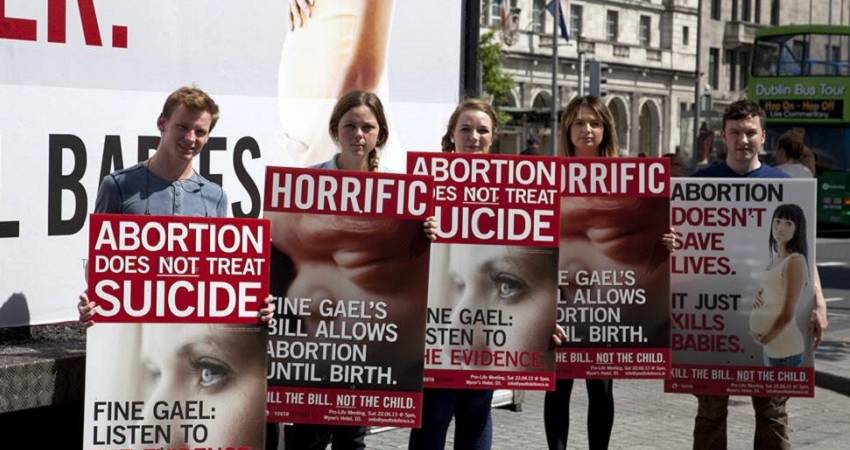Campaign
Kill the Bill, Not the Child
Kill the bill, Not the child.
A Bill has been published by the government (June 13 2013) which would allow abortions to take place in Ireland for the first time. It's name - Protection of Life during Pregnancy Bill - is a misnomer, since this Bill is primarily about legalising the deliberate killing of unborn children.
There are 7 Key things you must know about this Abortion Bill.
1. It allows abortion until birth on suicide grounds
The Bill permits abortion until birth on suicide grounds. There are no term limits in the proposed legislation, since there are no term limits in the X case.
This has been confirmed by Minister Alex White, who said there would be "no time limits" in the Bill, and by leading legal experts who testified before the Oireachtas Committee hearings, including Law Lecturer Dr Maria Cahill of UCC, Professor William Binchy of Trinity College and Barrister Paul Brady. Even legal experts who supported the abortion Bill agreed that no term limits were included in the legislation.
The death of the baby will be the aim of the procedure - and under Head 4 of the Bill the threat of suicide need not be inevitable nor immediate.
Supporters of the Bill, such as Dr Rhona O'Mahoney, have denied that late-term abortions will be carried out, and argue that doctors would be required to protect the life of the baby after viability.
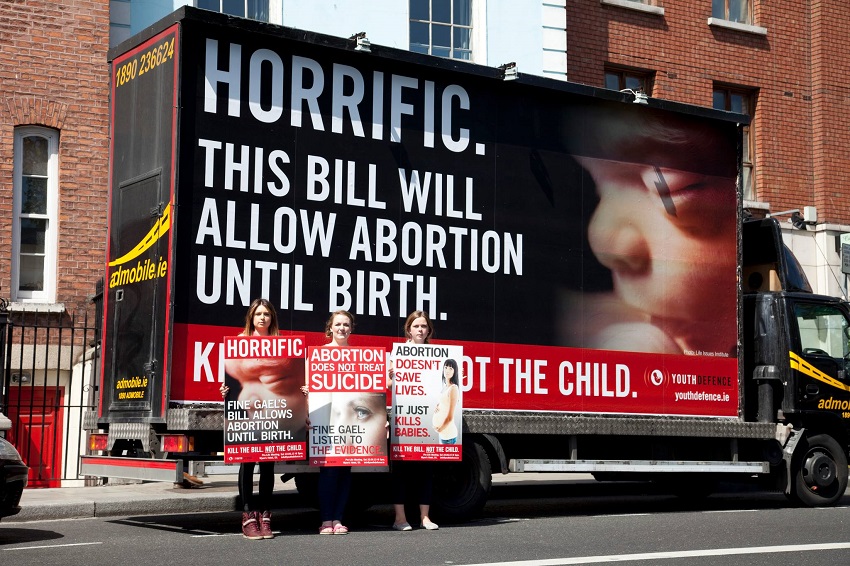
But there are two key issues here:
A. Where a mother says her pregnancy is causing her to be suicidal, while her child lives, the threat of suicide remains. The death of the unborn child - not the ending of the pregnancy - will then be the aim of the procedure under this Bill.This is consistent with the Supreme Court ruling in the X case and, in particular, with Justice Finlay's ruling that suicidality is a basis for the termination of the life of the unborn child.Of course, the evidence of all the medical experts is that abortion is not a treatment for suicidality. The government needs to listen to the evidence, and overturn X, not legalise abortion.
B. In any case, viability arises at 24 weeks. Aborting a baby at 23 weeks is a gruesome and horrendous procedure, usually involving a lethal injection to the heart or dismemberment of a child who has been fully formed for several months.
We have seen from the experience of other jurisdictions that legalising abortion on suicide grounds or mental health grounds has been widely abused: in California, despite very restrictive legislation, more than 61,000 abortions were carried out on mental health grounds in one year alone. In Britain, supposedly restrictive legislation has now led to a horrifying 190,000+ abortions every year, with 36% of those being repeat abortions.
2. It can force doctors to deliver healthy babies prematurely - even where a mother is physically healthy
In order to distract from the horror of late term abortion, Health Minister James Reilly is suggesting that, after 6 months gestation, the unborn baby could be delivered prematurely and kept alive.
That would deliberately inflict all the serious problems of extreme prematurity on a physically healthy baby, being born to a physically healthy mother.
Some of those problems include: brain damage, cerebral palsy, blindness, deafness, developmental problems - and even death.
All decent doctors would be appalled at this prospect - and many leading doctors have already expressed their deep concern at this proposal.
3. Top medical experts have said it causes 'major ethical and moral dilemmas'
The Master of Dublin's busiest Maternity hospital, Dr Sam Coulter Smith, told the recent Oireachtas Committee hearings that there are 'major ethical and moral dilemmas' arising for Obstetricians from the draft abortion Bill.
He also warned that it was his view, and that of his colleagues, that a possible 'surge' in the number of abortions would arise if the proposal became law.
Dr Coulter Smith said that there was no evidence that abortion was a treatment for suicidal ideation or intent, and that obstetricians were required to provide and practice evidence-based medicine.
He said that "our psychiatric colleagues tell us that there is currently no available evidence to show that termination of pregnancy is a treatment for suicidal ideation or intent and, as obstetricians, we are required to provide and practice evidence-based treatment".
The legislation, therefore, created an ethical dilemma for any obstetrician who is requested to perform a termination of pregnancy for the treatment of someone with either suicidal ideation or intent, he argued.
Dr Coulter Smith said that the fact that there is no gestational limit in the legislation relating to suicidality was a "a major ethical issue for obstetricians" and a source of serious concern.
Fellow Obstetrician, Dr John Monaghan, of Portiuncula Hospital, said he was extremely unhappy with the idea of Obstetricians becoming "mindless terminators for psychiatric reasons" and that the psychiatric or suicide risk clause has been brought in other jurisdictions and has been widely abused.
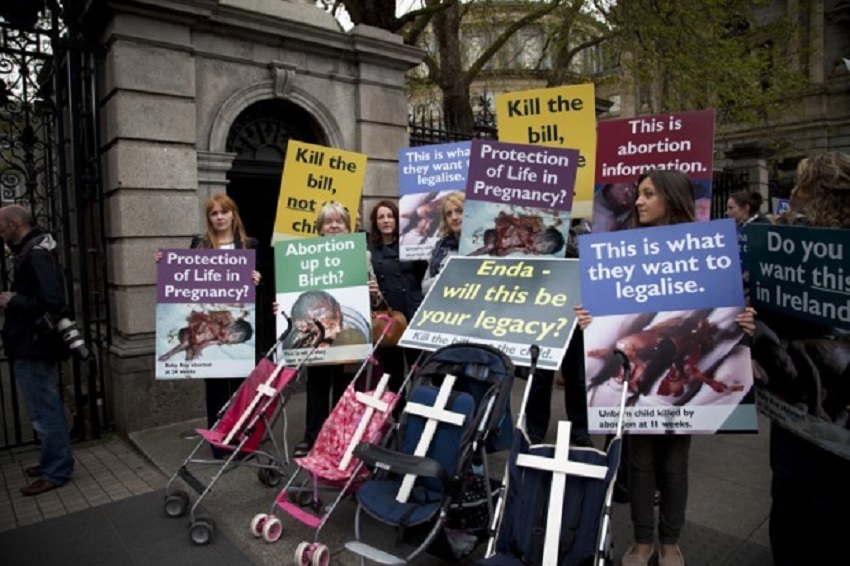
4. Psychiatrists have rejected the Bill, which could help to "normalise suicide" according to Ireland's leading expert on suicide
Psychiatric experts have rejected the Bill as being fatally flawed - and more than 120 psychiatrists have now opposed legalising abortion on suicide grounds.
Ireland's top expert on suicide and its causes, psychiatrist Professor Kevin Malone, said that the proposed abortion legislation could accelerate suicide rates in younger men because it would help to 'normalise' suicide.
"Contrary to the notion of it saving the lives of an extremely small number of females, it may be placing a greater number of young male lives at risk," he said.
He argued that abortion was not an evidenced based treatment for mental illness and asked "as a clinician, I wonder how then it can overnight become a recommended psychiatric treatment in Ireland."
Top perinatal psychiatrist, Dr John Sheehan, said that patients who were suicidal needed professional help, not an urgent termination of pregnancy. The proposal would make "psychiatrists the gatekeepers to abortion", he said, adding that since psychiatrists were unable to predict the future, the Bill would lead to multiple "false positives". He warned that late term abortion could have a very negative effect on the woman's mental health, and that abortion could increase the risk of mental health problems amongst women.
5. It allows for the 'ending' of unborn children's lives - and provides no voice for the baby
The Bill states repeatedly that it "shall not be an offence to carry out a medical procedure in the course of which, or as a result of which, unborn human life is ended".
The distinction between an unintended consequence and a direct action seems to be blurred in the Bill.
Currently, doctors in Ireland can always deliver an unborn baby early if a mother's life is in physical danger. But this Bill allows for the life of the baby to be 'ended' - and this action shall be required of doctors for the first time in Ireland where a woman says she is suicidal. The 'right' to an abortion will be decided by a panel of two psychiatrists in consultation with an obstetrician. Head 8 of the Bill provides that an appeal of a panel's decision can take place if a woman is refused an abortion. There is no right to appeal given on behalf of the unborn child.
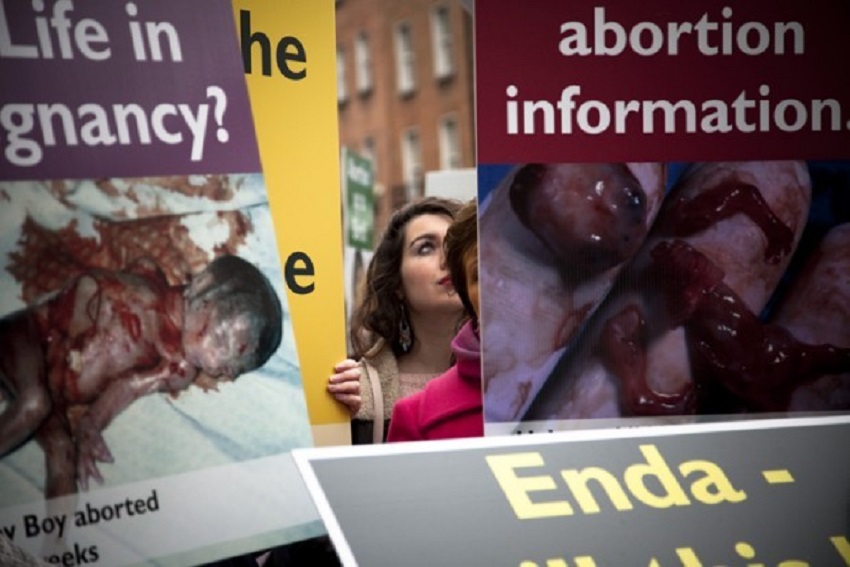
6. It radically changes Irish law and medical practice - and is not required by the European Court
Enda Kenny has protested that he is not seeking to change Irish law on abortion - but an Taoiseach knows full well that this Bill aims to allow the direct killing of unborn babies for the first time in Ireland.
Obstetrician Dr John Monaghan told the Oireachtas Committee hearings that the Bill would bring about "an enormous change in obstetric practice" where "an obstetrician is being asked to intervene in a physically healthy pregnancy".
Dr Sam Coulter Smith warned that it may lead to a surge in abortions, and bring an extra burden on over-stretched Irish hospitals.
Barrister Paul Brady pointed out that "it is clear that [the suicide clause] marks a change in the law. It is not accurate to say otherwise. It creates, for the first time, a statutory basis in Irish law for what may be a direct and intentional termination of an unborn child's life."
Barrister Suniva McDonagh also told the hearings that the Bill "represents a significant change in medical practice" and that for the first time in statute law "it is being provided that the actual treatment is the termination of the pregnancy. The proposed treatment is, in fact, abortion.”
The government is also insisting that Ireland is obliged to legalise abortion because of the European Court ruling in the ABC case. But that's simply untrue. The ruling simply asks Ireland to provide clarity in regard to available medical treatments - and doesn't mention suicide at all.
7. It seeks to legislate for the X case - but ignores developments in law since 1992
The Bill seeks to legislate for the X case and to therefore allow for abortion on suicide grounds.
However, in the X case, the claim that suicidality was a ground for abortion was a conceded point and was never argued, and therefore not decided, according to barrister, Paul Brady. That means that the X case ruling does not set a precedent according to constitutional law.
Mr Brady quoted Mr Justice Brian Walsh who said the X case ruling could only bind the particular case involved - the case of Miss X.
Justice Catherine McGuinness, who supports the abortion bill, also told the Oireachtas Committee hearings that the government was free not to legislate for X.
Legal expert, Dr Maria Cahill of UCC, also pointed out that the Bill ignores the fact that the X-case test has been developed in subsequent court cases.
In one case, Cosma v. Minister for Justice (2006) a woman sought that her deportation order be quashed on the grounds that if she were to be deported, she would commit suicide. The Minister refused to allow her to stay even after he had seen two psychiatric reports that detailed the strong possibility that she would commit suicide, and the court upheld the Minister's decision. In this case the High Court adopted and developed the test from the X case of real substantial risk to life. The High Court held that:
- Evidence of a treatment plan for a presenting psychiatric condition was required.
- Serious consideration had to be given to other means to end the risk to life.
- Public policy had to take into account that claims of suicidality could lead to an opening of what the Minister described as a "Pandora's box" which would, ultimately, if carried to the extreme, undermine the rule of law.
- The current abortion proposal violates those three findings.
Conclusion
Instead of ensuring that both mother and baby are safe, this Bill wants to begin the medieval practise of offering the violence of abortion as a solution to a woman in crisis. Where mental health issues arise in pregnancy, the answer must be to offer support, compassion and professional assistance. This Bill seeks to end the life of a baby instead.
This is a cruel, archaic and unacceptable Bill. It should be abandoned. Mothers and babies deserve better.
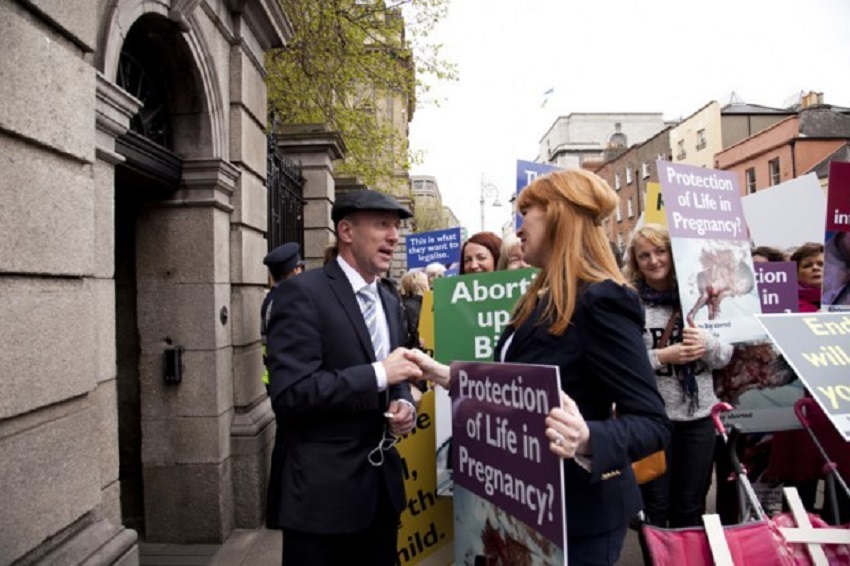
Why should this bill be scraped?
It's cruel and barbaric
Watch former abortionist Dr. Anthony Levatino testity before US Congress on what the procedure is for abortions on babies over 20 weeks.
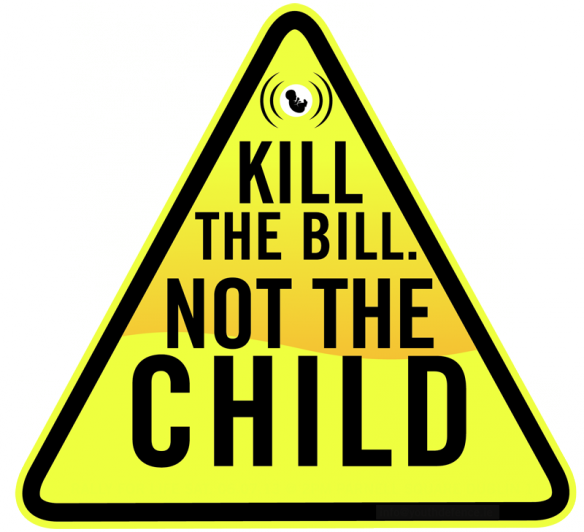
How they voted
In the Dáil
These TDs voted NO due to pro-life concerns
- Lucinda Creighton (FG - Dublin South East)
- Brian Walsh (FG - Galway East)
- Peter Mathews (FG - Dublin South)
- Billy Timmins (FG - Wicklow)
- Terence Flanagan (FG - Dublin Bay North)
Opposition TDs
- Peadar Tóibin (Sinn Féin - Meath West)
- Eamon Ó Cuiv (FF - Galway West)
- Charlie McConalogue (FF - Donegal North East )
- Seán Ó Fearghaíl (FF - Kildare South )
- Brendan Smith (FF - Cavan / Monaghan )
- John McGuinness (FF - Carlow/ Kilkenny)
- Seamus Kirk (FF - Louth )
- Dara Calleary (FF - Mayo)
- Robert Troy (FF - Longford / Westmeath )
- Michael McGrath (FF - Cork South Central)
- John Browne (FF - Wexford)
- Willie O'Dea (FF - Limerick City)
- Michael Kitt (FF - Galway East)
- Seán Fleming (FF - Laois / Offaly)
Independents
- Mattie Mc Grath (Independent - South Tipperary)
- Michael Healy Rae (Independent - South Kerry)
- Colm Keaveney (now resigned from Labour and officially an Independent - Galway East)
- Noel Grealish (Independent - Galway West)
- Denis Naughten (Independent - Roscommon / Sth Leitrim
- Michael Lowry (Independent - Tipperary North TD)
In the Seanad
These Senators voted NO due to pro-life concerns
Two Fine Gael senators
- Paul Bradford
- Fidelma Healy-Eames
Ten Fianna Fáil Senators
- Labhrás Ó Murchú
- Brian Ó Domhnaill
- Jim Walsh
- Marc MacSharry
- Paschal Mooney
- Terry Leyden
- Mark Daly
- Thomas Byrne
- Denis O’Donovan
- Diarmuid Wilson
- Jim Walsh
Three independent senators
- Mary Ann O’Brien
- Feargal Quinn
- Rónán Mullen
How TD's voted on the abortion bill
Today the Dáil voted to send the Abortion Bill to Committee Stage. This important update informs you as to what politicians opposed the Bill, what others are likely to and what others have said. It will be updated regularly to keep you informed as more TDs speak out on the Bill. Please call your TD who voted NO to thank them for standing for LIFE.
There is also a growing momentum in favour of putting the legislation to a referendum under Article 27 of the Constitution.
It is now being reported that Enda Kenny is threatening TDs with de-selection if they vote against this cruel and horrific Abortion Bill.
Government TDs
Fine Gael TDs who voted No to the bill and what they said
Brian Walsh:
The Bill would perpetuate the "absurd principle that the suicidality of one human being can be abated by the killing of another". " In truth, abortion is no more a treatment for suicidal ideation than suicide is a treatment for suicidal ideation.
Peter Mathews: "Mr. James Sheehan, who with Maurice Neligan and others founded the Blackrock, Galway and Hermitage clinics, and who has given more than 50 years' medical service to families, to men, to women and to babies - to everybody throughout his career - said only yesterday, with the wisdom of a long career, 'Peter, when people terminate a pregnancy at that stage, it is killing an unborn baby, and you are to use that word, because we in the profession have to do that procedure. It is killing an unborn baby.' That is very sad. That is why, at the core, I cannot support this Bill". He also quoted Consultant Obstetrician, Dr Louis Courtney, who wrote: "I worked for 35 years as a consultant with the best results in Ireland and the UK and was never curtailed by law to save women’s lives. Wars come and go. Famines come and go. But abortion comes and stays and eats its way into the heart of a people as it has done in England. Seven thousand, four hundred [abortions] in 1966. One hundred and fifty thousand in 1972. Two hundred thousand today.
Billy Timmins:
However, it is clear from reading this Bill that for the first time an Irish government is proposing to introduce a law that provides for the direct intentional targeting of the life of the unborn child." He also pointed out that: "I have received endless representations from members of the medical profession on the issue of suicide and Section 9 and almost unanimously they have been opposed to this measure.
Terence Flanagan: " For the very first time, we are stating in statute law that it is ok to deliberately and intentionally take the life of the unborn - direct abortion. This signals a real and significant cultural change in the practice of our hospitals and I have a real problem with this.
(Senator Fidelma Healy Eames has also said she cannot support the Bill. See below for other FG TDs who have expressed serious concerns.)
Opposition TDs
13 Fianna Fáil voted NO to the Bill's second stage and what some of those said in the Dáil
Eamon Ó Cuiv: "I cannot accept section 9 of the Bill in regard to suicide ideation. The arguments in this regard are well-rehearsed and well known. I am of the view that this section does not protect the right to life of the unborn for the following reasons: it will allow for the first time in Irish law the intentional killing of the unborn; it is generally accepted among experts in the field that abortion is not a recommended treatment for suicidal ideation in pregnant women; there are well established and evidence-based treatments for people who are suicidal as a result of mental illness in pregnancy; it is widely accepted that it is impossible to predict with any certainty whether a person who states they are suicidal is likely to commit suicide; there is no obligation on the person presenting under section 9 - which deals with suicidal ideation - to accept any other medical treatment that is recommended; it is accepted that suicide in pregnancy is very rare and there is no evidence that a provision such as this will reduce the risk of suicide in women and some would argue it could have the opposite effect; and there is no provision in this Bill, as pointed out by a retired Director of Public Prosecutions, to guarantee, and, as far as is practicable for the State - by its laws - to defend and vindicate the right to life of the unborn under this section. I hope I am wrong but I am of the view that this legislation will open the floodgates to widespread abortion.
Charlie McConalogue:
Another thing absent from the Bill is any legal protection for the unborn child. Under the Constitution, the child and the mother are afforded an equal right to life yet this legislation makes no provision for the child's rights to be vindicated nor for their situation to be represented.
Seán Ó Fearghaíl: In each and every case. it is essential to intervene to save the life of the mother. Equally, however, it is completely wrong to unnecessarily and deliberately take the life of the unborn child. I am convinced of the precious nature of human life in all its manifestations, from the point of conception to natural death.
Brendan Smith:
I wish to highlight in particular my concerns and total opposition to section 9". "Resources should not be found wanting at any stage to support women who face these particular difficulties. However, I will be voting "No" to this legislation. Like many colleagues on all sides of the House, section 9 dealing with suicidal ideation has determined my decision.
John McGuinness Seamus Kirk Dara Calleary Robert TroyMichael McGrath John BrowneWillie O'Dea Michael Kitt Seán Fleming
Independents
Mattie Mc Grath is a stalwart defender of human life and has spoken out strongly many times against the Bill. He voted NO.
Michael Healy Rae is strongly opposed to the legislation and is pro life. He voted NO.
Colm Keaveney (now resigned from Labour and officially an Independent) has voted No, saying: "Section 9 of the Bill will lead to abortion becoming far more widely available than its supporters, some of them disingenuously, now claim." "The rhetoric being deployed by supporters of this legislation contains much that is dishonest. I hope those people who continue making the utterings to which I referred earlier are aware of their dishonesty. For example, this is not a pro-life Bill, and Ministers who state that it is know that. I am old fashioned enough to believe that those of us in this House have a duty to be truthful."
Noel Grealish is pro-life and has voted NO. "This is an issue of moral conscience and personal belief. I am of the view that by opposing this Bill I am acting in the best interests of our citizens. We have a duty to protect the most vulnerable in our society and no one is more vulnerable than the unborn child," he told the Dáil. Denis Naughten voted NO and put forward amendments to the legislation and said: "The difficulty is that the suicide provision provides for a more liberal abortion regime than exists in the United Kingdom. There are no term limits on it, which means it provides legally for late-term abortions.
Peadar Tóibin from Sinn Féin voted NO and will lose the party whip. He told the Dáil: "Many will be conflicted between their party loyalties, careers and consciences. Neither my career nor any Deputy's is worth a jot in comparison with the life of one mother and the life of one child. In articulating my views on abortion, I do not seek to judge anyone. I am in no position to do so. I simply seek a health service whose objective is to save life on each and every occasion."
Michael Lowry, Tipperary North TD, voted NO.
What other government TDs have said at this point:
Lucinda Creighton: Is looking to have serious amendments made to the Bill: “I wonder what one should consult with when voting on a fundamental human rights issue such as this if it is not one's own conscience. My personal view is that all I can do when making a decision on life and death - and that is what we are considering here - is consult my conscience, which is based on my sense of what is right and wrong." "None of us is perfect but our life is worthy and we are all worthy of life. Who is any one of us to determine that one single life is not worth living or protecting?"
Róisín Shortall: has concerns re the lack of gestational limit - may vote No John O'Mahoney says he has concerns regarding the Bill. JP Phelan: Told the Dáil he had serious concerns regarding the legislation James Bannon: "The silent majority in this country do not see suicidal intent as a valid reason for an abortion procedure. Unfortunately, the Supreme Court held that the threat of suicide was a ground for getting an abortion. I said it before and I say it again that I am very concerned about the inclusion of suicidal intent as a ground for abortion. It has been pushed by many people as a means to deliver abortion on demand in this country. Suicidal intent is impossible to predict and equally impossible to define. The risk of suicide should not be included as a ground for abortion." Michelle Mulherin: "I have many issues of concern, as have many other speakers. I hope the Minister can bring clarity to these issues in his summing up on this Stage this evening." Kieran O'Donnell: "Since the publication of this Bill, the former Director of Public Prosecutions, DPP, Mr. Eamonn Barnes, has expressed the view that without representation for the unborn under section 9, which deals with risk of loss of life due to suicide, or sections 13 and 14, which deal with reviews, the Bill may be unconstitutional. The constitutionality of all aspects of the legislation needs to be looked at as it may possibly end up before the Supreme Court."
Opening the Floodgates?
Are the claims that allowing abortion for suicidality will "Open the floodgates" without foundation?
At the Health Committee Abortion hearings, Ciara Staunton from NUI Galway said that medical professionals have to be trusted for their clinical judgement that the threat of suicide is connected to the pregnancy. "There's this fear that there would be floodgates," she said.
"That fear is completely unfounded and it suggests that there would be some sort of collusion between the pregnant woman and the doctor. "That is not the case.
"We trust our doctors in every other clinical judgement they make, and we must continue to trust our doctors when it comes to the issue of abortion.
"It is very clear that it's only if the risk of suicide is linked to the preganancy, that case, there is a lawful abortion."
This is completely false. The recognition that the floodgates will open comes from the evidence, not fear.
The evidence is found in the American experience with mental health exceptions to abortion that occurred before Roe v Wade. In California's Therapeutic Abortion Act of 1967 http://scocal.stanford.edu/opinion/people-v-barksdale-22886 they tried to create a "balance" between the health of the mother and the state's interest in limiting abortion. To get an abortion, the mental illness of the mother had to reach the same medical standard for involuntarily committing a person to a mental health institution: "mental illness to the extent that the woman is dangerous to herself or to the person or property of others or is in need of supervision or restraint."
The woman needed a committee of two licensed doctors (or 3 if after the 13th week of pregnancy) to be in unanimous agreement to allow an abortion.
So, what happened? In 1970, just one year, there were 63,872 abortions approved and 61,572 performed! Virtually all of them, 98.2%, were approved and performed under the mental health exception. The Supreme Court, reflecting on the flood of abortions coming from the mental heath exception said, "Serious doubt must exist that such a considerable number of pregnant women could have been committed to a mental institution. Either pregnancy carries risks to mental health beyond those ever imagined, or legal writers and members of the therapeutic abortion committees, two groups we must assume to be of at least common intelligence, have been forced to guess at the meaning of this provision and have reached radically different interpretations."
So, are California doctors more prone to collusion than Irish doctors? Are they less trust worthy? That is not the issue. The issue is that abortion is never a treatment for mental health or suicide ideation (we know that it results in elevated levels of suicide ideation) and such legislative creations are based on politics and not on sound medicine. There is simply inherent ambiguity in the standard being applied and doctors should never be in a position of deciding whether an Irish baby is killed. It is by definition a corruption of their professional ethos to care for and heal life.
Paul Linton, U.S. Constitutional Scholar and Author on Abortion law in America discusses the debate on abortion in Ireland
Architect of British Abortion Law warns on suicide clause
It was reported in the Irish Independent on 21st December 2012, that LORD David Steel, the architect of Britain's liberal abortion laws, has said the Irish Government would be making a mistake if it goes ahead with plans to legislate for termination on the grounds of a threat of suicide.
The 1967 act permitted abortion up to the 28th week of pregnancy and Lord Steel has admitted that an Irish law which decides who can avail of a termination by ticking boxes would be "very difficult to implement".
"I think it would be a mistake to try and legislate for abortion in categories such as suicide or rape," he said. "We began with a bill with five categories, and sensibly, in consultation with the medical profession, they were reduced to two: the mental and physical health of the mother taking into account her whole family circumstances, and if there was a substantial risk of severe handicap.
He added: "It would seem the mistake being made in Ireland is to try to define the circumstances in which each abortion may be carried out and that is a hopeless road to travel down. I never envisaged there would so many abortions."
Following Britain's example?
A letter by ALISTAIR McFARLANE, an ex-gynaecologist who worked in both the UK and Ireland, the Irish Times on 11th January had a very interesting observation regarding legalising abortion for suicidal ideation.
As an ex-gynaecologist who has worked in both Ireland and Britain, I am naturally interested in the ongoing debate about legislation for abortion in Ireland. The big question seems to be whether legislating for abortion in Ireland will lead to “abortion on demand”. I refer to the reported interviews by the Seanad committee (Home News, January 9th). Dr Rhona Mahony, Master of the Rotunda, said that she was offended by the suggestion that women would attempt to manipulate their doctors on the basis of fabricated ideas of suicidal ideation or intention in order to obtain terminations. She was supported by Senator John Crown, who is also a doctor.
But there would be no question of “manipulation”; women wanting an abortion would know that all they would have to do was utter the phrase “suicidal thoughts” and an abortion would at once be granted in the private clinics set up to cope with the demand.
So these women, rather than lying to or manipulating their doctors, would just be going through a tedious, but required ritual.
If a psychiatrist had to certify that the suicidal ideation is genuine, then the clinics would simply employ one who is strongly pro-abortion and would automatically co-operate. The vast majority of psychiatrists who would not agree would be excluded from the decision-making process. That is what would happen in the real world.
See the original letter here in the Irish Times
